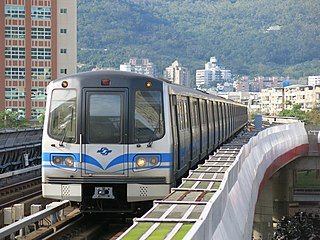
The Paris Métro, operated by the Régie autonome des transports parisiens (RATP), is a rapid transit system in the Paris metropolitan area, France. A symbol of the city, it is known for its density within the capital's territorial limits, uniform architecture and unique entrances influenced by Art Nouveau. The system is 226.9 kilometres (141.0 mi) long, mostly underground. It has 308 stations of which 64 have transfers between lines. There are 16 lines, numbered 1 to 14, with two lines, 3bis and 7bis, named because they started out as branches of Line 3 and Line 7, respectively. Line 1, Line 4 and Line 14 are automated. Lines are identified on maps by number and colour, with the direction of travel indicated by the terminus.

Orlyval is a light metro shuttle service at Paris's Orly Airport using the Véhicule Automatique Léger driverless, rubber-tyred people mover technology. The line, which opened on 2 October 1991, offers free service between the two airport terminal stations, and premium fare service to Antony station, where passengers can connect to the city's RER B trains. Orlyval is the second line to use the VAL technology after the Lille Metro and the first airport people mover system to use VAL.
The RATP Group, also known as the RATP or Régie autonome des transports parisiens, is a state-owned public transport operator and maintainer headquartered in Paris, France. Formed in 1949, it has its origins as the city's public transport operator. Its logo represents, in a stylised version, the Seine's meandering through the Paris area as the face of a person looking up.

London Buses is the subsidiary of Transport for London (TfL) that manages most bus services in London, England. It was formed following the Greater London Authority Act 1999 that transferred control of London Regional Transport (LRT) bus services to TfL, controlled by the Mayor of London.
SmartRider is the contactless electronic ticketing system of the Public Transport Authority of Western Australia. The system uses RFID smartcard technology to process public transport fares across public bus, train and ferry services.

Public transport in Istanbul comprises a bus network, various rail systems, funiculars, and maritime services to serve the more than 15 million inhabitants of the city spread over an area of 5712 km2.

Paris Métro Line 1 is one of the sixteen lines of the Paris Métro. It connects La Défense–Grande Arche in the northwest and Château de Vincennes in the southeast. With a length of 16.5 km (10.3 mi), it constitutes an important east–west transportation route within the City of Paris. Excluding RER commuter lines, it is the busiest line on the network with 181.2 million travellers in 2017 or 496,000 people per day on average.

The RATP bus network covers the entire territory of the city of Paris and the vast majority of its near suburbs. Operated by the Régie Autonome des Transports Parisiens (RATP), this constitutes a dense bus network complementary to other public transport networks, all organized and financed by Île-de-France Mobilités.

London has an extensive and developed transport network which includes both public and private services. Journeys made by public transport systems account for 37% of London's journeys while private services accounted for 36% of journeys, walking 24% and cycling 2%. London's public transport network serves as the central hub for the United Kingdom in rail, air and road transport.

A passenger information system, or passenger information display system, is an automated system for supplying users of public transport with information about the nature and the state of a public transport service through visual, voice or other media. It is also known as a customer information system or an operational information system. Among the information provided by such systems, a distinction can be drawn between:
Calypso is an international electronic ticketing standard for microprocessor contactless smart cards, originally designed by a group of transit operators from 11 countries including Belgium, Canada, France, Germany, Italy, Latvia, México, Portugal and others. It ensures multi-sources of compatible products, and allows for interoperability between several transport operators in the same area.

The Montmartre Funicular is an inclined transport system serving the Montmartre neighbourhood of Paris, France, in the 18th arrondissement. Operated by the RATP, the Paris transport authority, the system opened in 1900; it was entirely rebuilt in 1935 and again in 1991.

Vix Technology (Vix) is an Australian company that designs, supplies and operates automated fare collection (AFC) systems, intelligent transportation systems (ITS), access, payment and passenger information display systems (PIDS) for the public transit industry.

The OV-chipkaart is a contactless smart card system used for all public transport in the Netherlands. First introduced in the Rotterdam Metro in April 2005, it has subsequently been rolled out to other areas and travel modes. It fully replaced the national strippenkaart system for buses, trams, and metro trains in 2011, and the paper ticket system for rail travel in July 2014.

Semitan is the company responsible for the comprehensive public transport network of Nantes Métropole, the urban community of the French city of Nantes. The network operated by Semitan is marketed under the name and logo TAN and this abbreviated form is also sometimes used to refer to the company. Semitan is itself an acronym for the Société d'Economie Mixte des Transports de l'Agglomération Nantaise. The TAN network comprises three Tramway lines, two Busway lines, an extensive network of buses, an airport shuttle bus line, two Navibus lines and a night bus network. A single common fare system covers all these modes and also extends to suburban trains within the Métropole boundaries, although these trains are not operated by Semitan.

Public transport is a system of transport for passengers by group travel systems available for use by the general public unlike private transport, typically managed on a schedule, operated on established routes, and that charge a posted fee for each trip. There is no rigid definition of which kinds of transport are included, and air travel is often not thought of when discussing public transport—dictionaries use wording like "buses, trains, etc." Examples of public transport include city buses, trolleybuses, trams and passenger trains, rapid transit and ferries. Public transport between cities is dominated by airlines, coaches, and intercity rail. High-speed rail networks are being developed in many parts of the world.

The Casablanca Tramway is a low-floor tram system in Casablanca, Morocco. As of 2019, it consists of two lines - T1 from Sidi Moumen to Lissasfa, and T2 from Sidi Bernoussi to Aïn Diab—which intersect at 2 points and form a 47 km (29 mi) network with 71 stations. Two additional lines, T3 and T4, are scheduled to open in 2024.
Transdev, formerly Veolia Transdev, is a France-based international private-sector company which operates public transport. It has operations in 17 countries and territories as of November 2020.

Ticketer is the brand name for a range of electronic ticket machines provided by British company Corvia Ltd, primarily for usage on buses. The "innovative" cloud-based system, first marketed on a small scale in 2008, has since developed into a rival to the three major ticket issuing systems used by bus companies throughout Britain.
National Ticketing Solution (NTS) is a public transport payment system in development for New Zealand. It is contracted to American company Cubic. It is expected to start roll out in the Canterbury region in 2024 and available nationwide by 2026.















